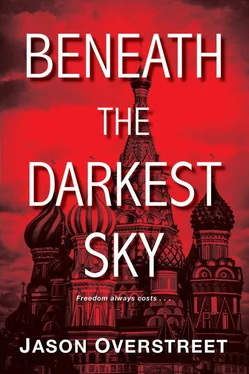“Yes, Commander Koskinen.”
“Stalin believes it is all about exporting food to the West and importing machinery into the Soviet Union. As Stalin has said about his continuing Five Year Plans, ‘Technical skills and machines will decide everything.’ So… you see… you zeks are nothing to him. I am nothing to him. If only my Trotsky would return from exile. A dream!” He sat back. “Well, Comrade Sweet, anything else?”
“I… I must ask. Two other comrades of mine in the camp here, Yury—”
“I cannot help them. You are trying to see if they can stay here?”
I nodded.
“I cannot do that. It is logical regarding your boy. Your comrades… no.”
“Yes, Commander Koskinen.”
“Your Russian is excellent, Comrade Sweet. But how do you feel about your America?”
I was guessing that my answer would carry significant weight. And I was certain that he, like most Soviet brass, detested my country. Even if he didn’t, I couldn’t afford to say something positive.
“I hate America,” I said. “That is why I moved to Moscow and learned your language. They treated me like trash back in America. It was only when I got to Moscow that I felt like a human being for the first time. I was all too surprised when I was arrested, for I love the Soviet Union.”
“Good,” he said. “Me too!”
* * *
Later that night I lay in my bunk talking to Yury. I was devastated that he and Boris would be leaving soon, much earlier than I’d previously guessed. But I could do nothing about it.
“Koskinen says it will remain Lagpunkt Seventy-Nine when you all leave,” I whispered to Yury in barely audible Russian. “But a freshly shipped-in batch of zeks will replace you. This cycle will continue until Seventy-Nine is full of a thousand highly skilled laborers. Zeks who know contracting! How is Boris?”
“I don’t know,” said Yury. “I hope he is holding up. I could see the bones in his back too much when I last saw him. I could see far too many bones.”
“Once you all depart, you’ve got to maybe figure out an escape. Maybe after you stop and set up camp—”
“There is no way out. They have guns. And Drugov told us that no one has ever escaped the Sevvostlag prison system in this area. You know this! And even if we can manage to escape the camp, the bears will kill us. Many have met such fates.”
“Don’t talk about bears,” I whispered.
“It’s true, Prescott. I would rather work all day and even sleep in a big ice pit at night if need be. The old man said he’d heard of such sleeping conditions.”
“What!”
“I’m just telling you what he said. Maybe it was a form of punishment. Maybe it was because they ran out of tents.”
“I don’t believe that, Yury. Sounds like an old wives’ tale.”
“Believe it! I’m sure they do such things.”
“Or not!”
“I’m just thinking of the worst-case scenario, Prescott. The old man said to start from thinking the worst and then work your way back from there. No surprises!”
“Makes sense.”
“I am no longer afraid to die, Prescott. The old man is with God. I am not afraid because I can go see God, too. I am happy for you and James. But I am not afraid to go see God now. I have accepted my fate. No one survives the Road of Bones.”
Moscow, Russia
December 1934
SINCE THE TIME I’D FIRST MET LOVETT FORT-WHITEMAN BACK IN September, I’d gotten to know him much better. Loretta and I had attended the shindig at his apartment and had been introduced to several interesting people, many of them colored.
Perhaps the most fascinating was not colored, however. His name was Karl Radek, a friend of Lovett’s, and a close associate of Stalin’s. Radek wrote for Pravda , the official newspaper of the Communist Party of the Soviet Union, and he was actually helping to write the Soviet Constitution. Much controversy surrounded him, as many wondered, especially Stalin, if Radek had lied his way back into the Soviet Union by swearing he was no longer loyal to Leon Trotsky. Meeting the editor had been fascinating, as this was a politico who not only conversed with Lovett and Stalin, but also Bullitt. According to Lovett, the ambassador had been trying to get Radek to help him convince Litvinov and Stalin to make good on the debt issue.
I’d still been trying like hell to make progress on finding the hidden microphones in the bowels of Spaso House, but to no avail. Luckily, I wasn’t getting constant pressure from the ambassador, as he was back in the U.S. and might not be back until April. Nevertheless, much to Bobby’s dismay, Bullitt had assigned me to remain at Spaso and help with technical issues until the new ballroom was complete. And he’d made me swear I’d do my best to locate the hidden microphones. So, I’d had my hands full trying to figure out a way to get the keys away from Sergei.
It was now Christmas Eve and I had quite an eventful day in front of me. Loretta and I were on our way to hear Paul Robeson speak. Apparently he was beyond excited to visit Moscow for the first time and wanted to say a few words to us American coloreds. After we were finished hearing Robeson, the plan was to meet Dorene and Bobby at Gorky Park so the four children could play in the snow and drink hot cocoa. Then the four adults would get ready for the big Christmas Eve party set to take place at Spaso House.
Both of us wearing black wool trench coats, Loretta and I arrived at the Theater of People’s Art at around noon. When we entered the lobby, a racially mixed crowd of folks were mingling. There was an excitement in the air—everyone bundled up in long coats, hats, and boots, as the light snow had been continuous for days.
“There’s Lovett!” said Loretta, pointing across the lobby and removing her gray fur ushanka .
“I see he’s in full swing already,” I said, as we slid our wet gloves off and made our way through the throng.
“I SEE YOU TWO!” shouted Lovett through the noise.
“You holding court?” I said, shaking his hand before he kissed Loretta on the cheek.
There were handshakes and kisses all around, as many familiar colored faces were surrounding Lovett. One thing we’d quickly learned since arriving in Moscow: all of the colored folks knew one another, even if casually. And whenever an event came up that involved anything they might be remotely interested in, everyone seemed to show up, just as they had when we’d first arrived in Moscow at the National Hotel.
Taking off my black fedora, I took inventory of the folks surrounding Lovett and was glad to see these folks again. All of them, again, were noted individuals, here in Moscow because of their talent as performers, scientists, artists, or engineers. There was Robert Robinson, Lloyd Patterson, Homer Smith, Oliver Golden, George Tynes, Coretta Arle-Titz, Robert Ross, Wayland Rudd, and William L. Patterson. Other than Lovett, the only ones I knew fairly well were Robert Robinson and Homer Smith, as we’d conversed on several occasions. Robert was a popular engineer, and Homer was a journalist and postal worker.
“Where is that lovely wife of yours, Lovett?” said Loretta.
“B isn’t feeling well at the moment,” he said. “She has a cold. I’ve got my Russian queen locked in bed with hot tea and biscuits.”
“I’m sorry to hear that,” said Loretta. “Tell her I send hugs and kisses.”
Lovett placed his hands together in a prayer position and mouthed a “thank you” to her. Then he took my arm and gently led me away from the group.
“Pardon us for a moment, y’all,” he said, never one to shy away from doing exactly what he wanted to do, right when he wanted to do it.
Читать дальше











